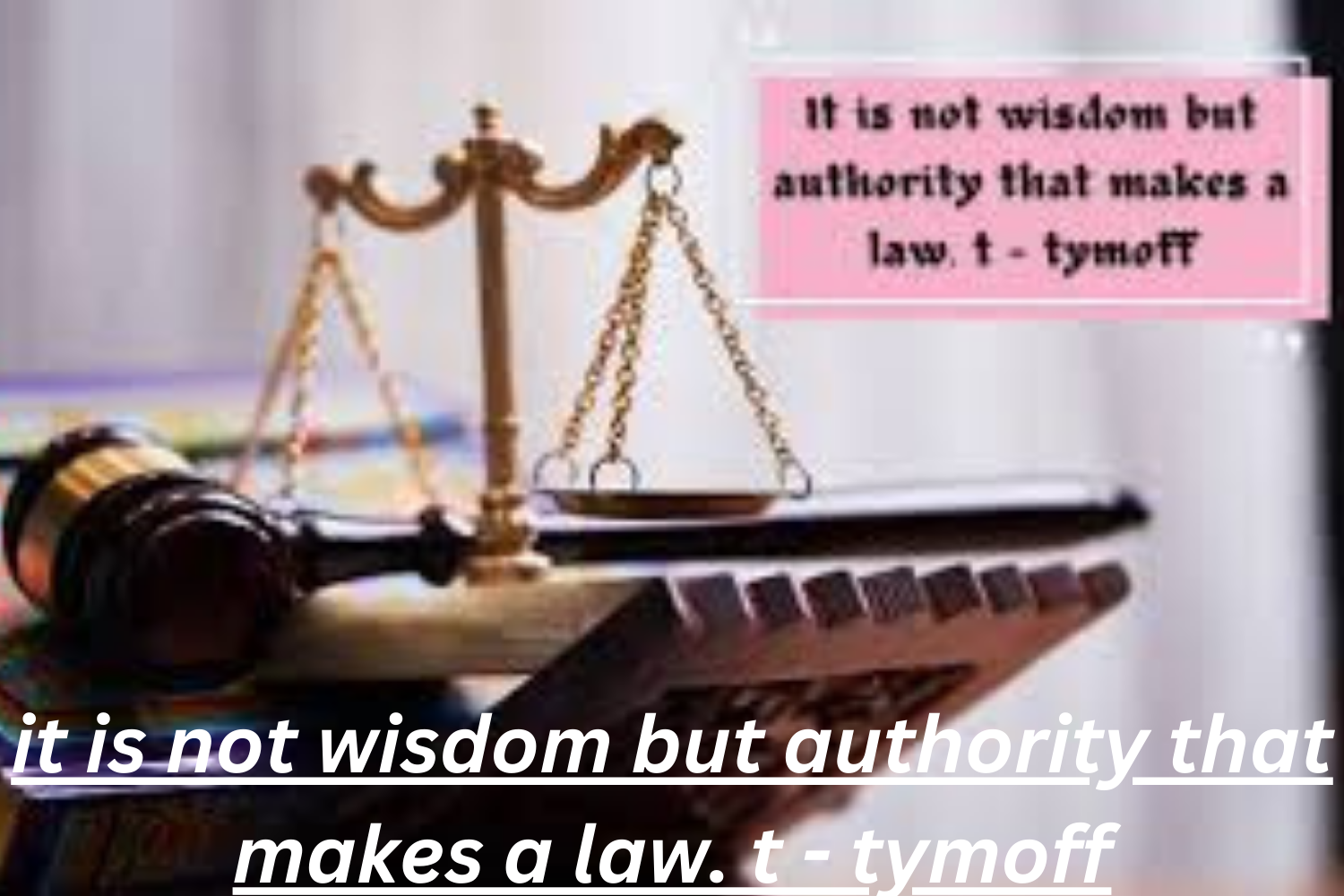Imagine a world where laws are crafted with pure wisdom. A place where justice flows from deep understanding and insight. Yet, reality often tells a different story. The quote “it is not wisdom but authority that makes a law. t – tymoff challenges our perceptions of how laws come to be. It pushes us to reflect on the dynamics between knowledge and power in shaping the rules we live by.
As we delve into this thought-provoking idea, we’ll explore what it means to have authority in lawmaking versus the importance of wisdom. Are our laws truly reflective of collective reasoning? Or do they simply echo those who hold power? Join me as we uncover the intricate relationship between wisdom and authority in creating effective legal frameworks for society’s betterment.
Defining Wisdom and Authority
Wisdom and authority each hold significant roles in society. Yet, they are fundamentally different concepts.
Wisdom embodies knowledge, experience, and sound judgment. It’s the ability to discern right from wrong based on understanding rather than mere facts. Wisdom often evolves through personal experiences and reflection.
Authority, on the other hand, is about power and control. It stems from position or influence rather than insight. Authority can compel compliance but lacks the moral compass that wisdom provides.
While wisdom enlightens decisions with ethical considerations, authority enforces rules without necessarily reflecting their fairness or effectiveness. Understanding these terms helps clarify their impact on lawmaking and governance dynamics within our communities.
The role of Wisdom in creating laws
Wisdom plays a fundamental role in crafting laws that resonate with justice and morality. It involves an understanding of human nature, societal needs, and ethical considerations.
When lawmakers draw upon wisdom, they often consider the long-term implications of their decisions. This foresight can lead to regulations that promote fairness and equity rather than mere compliance.
Additionally, wisdom encourages empathy. When legislators incorporate diverse perspectives into lawmaking processes, they create frameworks more likely to serve the public good.
Through thoughtful deliberation and reflection on historical contexts, wise lawmakers can avoid repeating past mistakes. Laws rooted in wisdom tend to foster trust between citizens and governance.
The process requires imaginative thinking that transcends rigid authority. By valuing wisdom alongside other elements of lawmaking, societies can cultivate legal systems that uplift individuals rather than constrain them unnecessarily.
The influence of Authority in lawmaking
Authority plays a crucial role in the realm of lawmaking. It is often the backbone that supports legislative processes and enforces compliance. Without authority, laws may lack enforcement and credibility.
Legislators, judges, and governing bodies wield this power to create and implement regulations. Their authority stems from democratic mandates or institutional roles designed to uphold order within society.
When faced with public discontent or crises, those in authority can swiftly enact laws aimed at addressing urgent issues. This ability can be both a blessing and a curse; rapid changes may lead to effective solutions but could also result in hasty decisions lacking thorough consideration.
Moreover, authority shapes societal perceptions of justice and fairness. The legitimacy granted by authoritative figures helps instill trust among citizens, fostering an environment where laws are respected rather than resisted.
Examples of laws based on Wisdom and Authority
Laws can emerge from both wisdom and authority, shaping society in different ways. Take the landmark Civil Rights Act of 1964. This law arose from a profound understanding of justice and equality, reflecting societal wisdom about human rights. It challenged existing authority that perpetuated discrimination.
On the flip side, consider traffic regulations. These laws often stem from authoritative bodies prioritizing safety over individual opinion or judgment. They exist to maintain order on the roads, emphasizing that authority can sometimes override personal freedoms for the greater good.
Another example is environmental legislation like the Clean Air Act. Here, wisdom plays a pivotal role by recognizing humanity’s responsibility toward nature while backed by governmental authority to enforce compliance among corporations it is not wisdom but authority that makes a law. t – tymoff.
Both types illustrate how laws are crafted not just through wise reasoning but also by wielding power effectively to create practical solutions for communal living.
The impact of Wisdom and Authority on society
Wisdom and authority play distinct roles in shaping society. Wisdom fosters understanding, empathy, and insight. It encourages thoughtful dialogue around issues that matter deeply to communities.
On the other hand, authority enforces order and compliance. Laws backed by authority provide a framework within which society operates. This structure can lead to stability but may also stifle innovation if not tempered with wisdom.
When laws arise solely from authority without the guiding touch of wisdom, they risk becoming rigid or unjust. People may feel alienated or oppressed under such systems.
Conversely, wise leadership that incorporates community values can inspire trust and cooperation among citizens. When individuals see their voices reflected in laws, societal bonds strengthen.
The dance between wisdom and authority is complex yet vital for progress. Striking this balance determines whether societies flourish or falter amidst change.
Balancing Wisdom and Authority in lawmaking
Balancing wisdom and authority in lawmaking is essential for a just society.
When lawmakers rely solely on authority, they risk creating laws that may not serve the common good. Rigid adherence to power can stifle creativity and compassion within legal frameworks.
Conversely, if decisions are made purely based on wisdom without proper authority, chaos can ensue. The absence of enforcement mechanisms might lead to confusion among citizens about what is expected of them.
Finding harmony between these two elements creates laws that resonate with both moral principles and practical governance. Engaging a diverse group of voices helps ensure that legislation reflects community values while also maintaining order.
This balance fosters trust in institutions. it is not wisdom but authority that makes a law. t – tymoff empowers citizens by making them feel valued in the decision-making process, leading to more effective implementation of laws across society.
Conclusion: The importance of considering both wisdom and authority in creating effective laws for the betterment of society
Creating laws is a complex process that requires careful consideration of both wisdom and authority. Wisdom brings insight, foresight, and an understanding of human nature. It allows lawmakers to create regulations that are not just functional but also just and equitable.
On the other hand, authority provides the structure needed for those laws to be enforced effectively. Authority can ensure compliance and maintain order within society. However, reliance solely on authority without the guiding light of wisdom can lead to unjust laws that do not serve the people’s best interests.
The balance between these two elements is crucial for effective lawmaking. Authorities must listen to wise counsel while ensuring their decisions have legitimacy and enforceability. This thoughtful approach will foster a legal system that promotes justice, respect for individual rights, and social harmony.
Integrating wisdom with authority leads to stronger legislation—laws that reflect our collective values while maintaining order in society. Therefore, as we navigate through governance today, it becomes essential to keep this balance in mind for future generations’ betterment.

